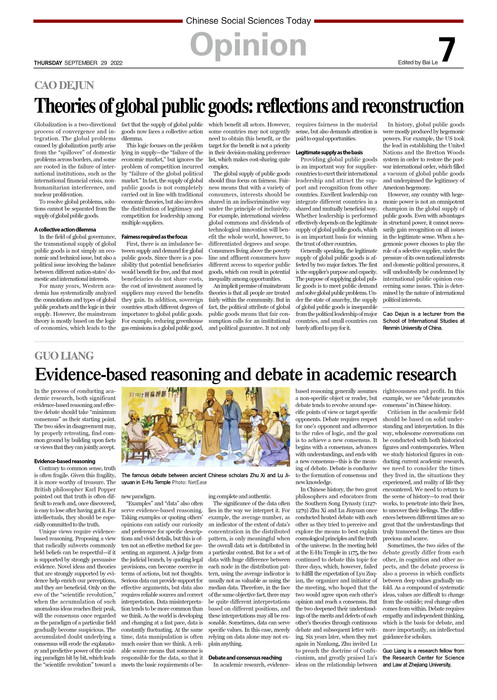Evidence-based reasoning and debate in academic research
2022-09-29 14:23:25
The famous debate between ancient Chinese scholars Zhu Xi and Lu Jiuyuan in E-Hu Temple Photo: NetEase
In the process of conducting academic research, both significant evidence-based reasoning and effective debate should take “minimum consensus” as their starting point. The two sides in disagreement may, by properly retreating, find common ground by building upon facts or views that they can jointly accept.
Evidence-based reasoning
Contrary to common sense, truth is often fragile. Given this fragility, it is more worthy of treasure. The British philosopher Karl Popper pointed out that truth is often difficult to reach and, once discovered, is easy to lose after having got it. For intellectuals, they should be especially committed to the truth.
Unique views require evidence-based reasoning. Proposing a view that radically subverts commonly held beliefs can be respectful—if it is supported by strongly persuasive evidence. Novel ideas and theories that are strongly supported by evidence help enrich our perceptions, and they are beneficial. Only on the eve of the “scientific revolution,” when the accumulation of such anomalous ideas reaches their peak, will the consensus once regarded as the paradigm of a particular field gradually become suspicious. The accumulated doubt underlying a consensus will erode the explanatory and predictive power of the existing paradigm bit by bit, which leads the “scientific revolution” toward a new paradigm.
“Examples” and “data” also often serve evidence-based reasoning. Taking examples or quoting others’ opinions can satisfy our curiosity and preference for specific descriptions and vivid details, but this is often not an effective method for presenting an argument. A judge from the judicial branch, by quoting legal provisions, can become coercive in terms of actions, but not thoughts. Serious data can provide support for effective arguments, but data also requires reliable sources and correct interpretation. Data misinterpretation tends to be more common than we think. As the world is developing and changing at a fast pace, data is constantly fluctuating. At the same time, data manipulation is often much easier than we think. A reliable source means that someone is responsible for the data, so that it meets the basic requirements of being complete and authentic.
The significance of the data often lies in the way we interpret it. For example, the average number, as an indicator of the extent of data’s concentration in the distributed pattern, is only meaningful when the overall data set is distributed in a particular context. But for a set of data with huge difference between each node in the distribution pattern, using the average indicator is usually not as valuable as using the median data. Therefore, in the face of the same objective fact, there may be quite different interpretations based on different positions, and these interpretations may all be reasonable. Sometimes, data can serve specific values. In this case, merely relying on data alone may not explain anything.
Debate and consensus reaching
In academic research, evidence-based reasoning generally assumes a non-specific object or reader, but debate tends to revolve around specific points of view or target specific opponents. Debate requires respect for one’s opponent and adherence to the rules of logic, and the goal is to achieve a new consensus. It begins with a consensus, advances with understandings, and ends with a new consensus—this is the meaning of debate. Debate is conducive to the formation of consensus and new knowledge.
In Chinese history, the two great philosophers and educators from the Southern Song Dynasty (1127-1279) Zhu Xi and Lu Jiuyuan once conducted heated debate with each other as they tried to perceive and explore the means to best explain cosmological principles and the truth of the universe. In the meeting held at the E-Hu Temple in 1175, the two continued to debate this topic for three days, which, however, failed to fulfill the expectation of Lyu Zuqian, the organizer and initiator of the meeting, who hoped that the two would agree upon each other’s opinion and reach a consensus. But the two deepened their understandings of the merits and defects of each other’s theories through continuous debate and subsequent letter writing. Six years later, when they met again in Nankang, Zhu invited Lu to preach the doctrine of Confucianism, and greatly praised Lu’s ideas on the relationship between righteousness and profit. In this example, we see “debate promotes consensus” in Chinese history.
Criticism in the academic field should be based on solid understanding and interpretation. In this way, wholesome conversations can be conducted with both historical figures and contemporaries. When we study historical figures in conducting current academic research, we need to consider the times they lived in, the situations they experienced, and reality of life they encountered. We need to return to the scene of history—to read their works, to penetrate into their lives, to uncover their feelings. The differences between different times are so great that the understandings that truly transcend the times are thus precious and scarce.
Sometimes, the two sides of the debate greatly differ from each other, in cognition and other aspects, and the debate process is also a process in which conflicts between deep values gradually unfold. As a compound of systematic ideas, values are difficult to change from the outside; real change often comes from within. Debate requires empathy and independent thinking, which is the basis for debate, and more importantly, an intellectual guidance for scholars.
Guo Liang is a research fellow from the Research Center for Science and Law at Zhejiang University.


